The Goldfinch: Donna Tartt
£9.60£10.40 (-8%)
Winner of the Pulitzer Prize for Fiction 2014
Aged thirteen, Theo Decker, son of a devoted mother and a reckless, largely absent father, survives an accident that otherwise tears his life apart. Alone and rudderless in New York, he is taken in by the family of a wealthy friend. He is tormented by an unbearable longing for his mother, and down the years clings to the thing that most reminds him of her: a small, strangely captivating painting that ultimately draws him into the criminal underworld. As he grows up, Theo learns to glide between the drawing rooms of the rich and the dusty antiques store where he works. He is alienated and in love – and his talisman, the painting, places him at the centre of a narrowing, ever more dangerous circle.
The Goldfinch is a haunted odyssey through present-day America and a drama of enthralling power. Combining unforgettably vivid characters and thrilling suspense, it is a beautiful, addictive triumph – a sweeping story of loss and obsession, of survival and self-invention, of the deepest mysteries of love, identity and fate.
Read more
Additional information
| Publisher | Abacus, 0 edition (5 Jun. 2014) |
|---|---|
| Language | English |
| Paperback | 880 pages |
| ISBN-10 | 9780349139630 |
| ISBN-13 | 978-0349139630 |
| Dimensions | 13 x 4.1 x 19.5 cm |

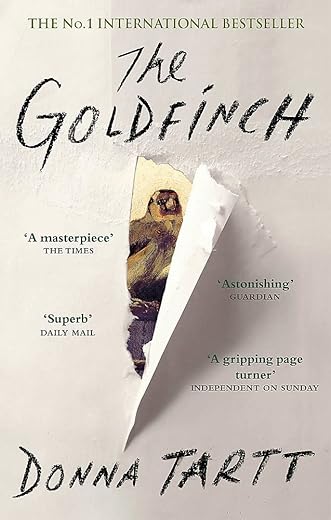

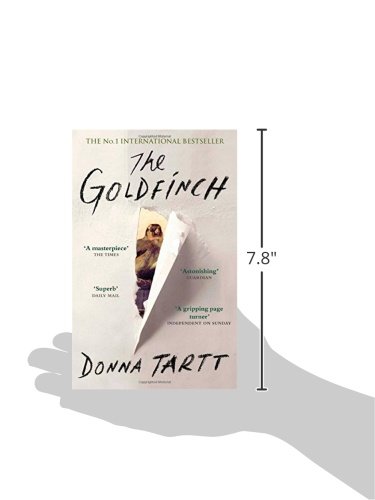
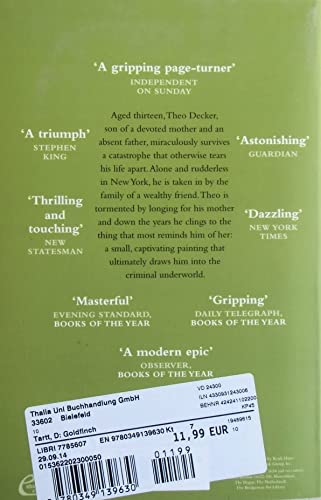
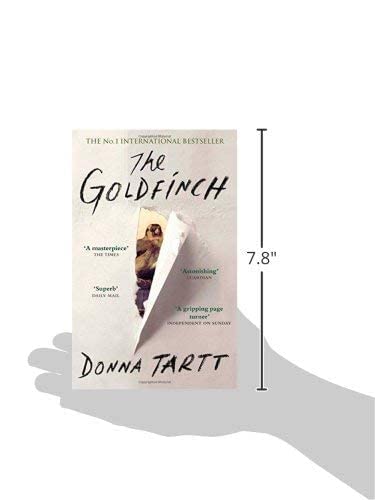
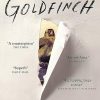
by Cornwallgurl
Should I really be the two thousand and somethingth reviewer of this book? I don’t know, but I do feel strongly about it given the time I spent reading it! One of my sons lent me “The Little Friend” quite a while ago and I was blown away by it. I thought Donna Tartt was an outstanding author and found the book completely absorbing. Some years later I got round to taking “The Secret History” on holiday and enjoyed it very much, despite some infelicities and irritants – I kept reminding myself this was a terrific first novel by a very young author. On reflection, I can’t remember much about “The Little Friend”, and a few things about the Secret History irked me – particularly the odd lack of sense of time. I assumed, from much that was written that it was set in the 1950’s or early 60’s, only to be startled by mention of ATM’s. I noted the prancing around in expensive tweed suits and the grandness of the background of many of the characters, and the strange lack of development of some of the major ones. I found the fact that the narrator seemed to ingest large quantities of drugs and alcohol and nonetheless function quite normally irritating and/or boring. These memories came back very strongly when I read the Goldfinch. I was really looking forward to it, despite the massive hype. I tried hard to set aside difficult personal circumstances whilst reading it – it’s not a bundle of laughs or meant to be. The start was thrilling and interesting, although as someone who has lost a close relative in a terrorist bombing incident I found it simultaneously both hard to read and at the same time unconvincing. This was a real city, real art gallery and a real painting. It was a fiction book, but I just couldn’t believe the whole incident or much relating to it. I do not need to like or admire the characters in a book to enjoy it, but my goodness you wouldn’t want to meet most of this gang. Only the delightful Hobie and to me, Mrs Barbour, came out with any credit or degree of likeableness. And again, major characters were very sketchily portrayed – Kitsey was just a cipher – I could not envisage her or why Theo would even consider marrying her. Pippa likewise was hard to see as a real, damaged person. Boris on the other hand rather stole the show. I was so bored with the endless descriptions of drug taking that I nearly lost the will to read on. Once, okay, but time after time just left me cold. There was a middle section of the book when I really wondered if I was going to finish it. And again, there was this weird sense of it not being in any particular period. Clearly, as there were random references to modern mobile phones it was meant to be contemporaneous, but it never felt like it. I had to keep reminding myself as all these people floated around in very expensive suits and hand made shoes and talked knowledgeably about obscure art and furniture (which really interests me in real life, so I was disappointed to find it drear) that they were in the main young (Theo was only 27, as I recollect) and that it was here and now. Theo’s mother was another lightly sketched riddle – was she all she seemed? Did she have a shady life that partly caused his despised father to leave? How did they afford a housekeeper if they were so poor and are Kentucky horse dealers the kind of people who have antiques and good jewellery? Perhaps I just don’t understand American social mores. Then it sort of descended into a kind of gangsterish noir in Amsterdam (but at least it had a bit of pace) with a whole new cast of baddies and then finished up on a grandiosely moral note with copious reflections on life, art, the universe and everything. I confess to a sigh of relief that at least I’d managed to finish it, but with a distinct lack of engagement, sympathy or any real enjoyment, and I really, really wanted to like it, too. 3 stars is harsh (I’d give it 3 1/2 if I could) as Donna Tartt undoubtedly has a brilliant turn of phrase and occasionally you just go “WOW” at the writing – but not often enough to lift the whole, for me at any rate.
by Katharine Kirby
Like the Ancient Mariner, Theo Decker has an Albatross around his neck. Just a Goldfinch though, for his burden, a bird a fraction of that size. Eleven years in construction, an eye achingly lengthy 864 pages spent in this very mixed up chap’s company, was a long haul, a marathon of reading. Halfway through, with the paperback at last spread open making it easier to turn the pages; there is still another whole book’s worth left. Weirdly though, at the end, I could have gone on longer, enjoyed the consequences of the finale, seen into the future further. Apparently 44% of readers give up on this book, as I had done myself when it first came out. This month, being our book club choice, I really went for it and I am grateful that I did. Going back to read the start again was interesting, giving deeper meaning to the events around the terrorist bomb, (‘Behind the Scenes at the Museum’) and the things said at the time by the dying man Theo stayed with. Yes, you could well read it twice.
Hypnotic, addictive, I was on edge from the word go, trying to work out motivations, dangers, and hidden agendas. Those of the duplicitous dad, the stoned step mum, and the kindly old bachelor furniture restorer, and the two male friends of his own age Theo makes. Street kid Boris being definitely a bad boy, unstable influence, lurching from crisis to crisis with misplaced but empowering confidence, capable of anything, even if only in his teens when we meet him. Nerdy Andy Barbour in his lavish apartment with his uptight family, quite the opposite.
Hacking my way through the forest of bad choices, secretively pursued, unadorned by any social nicety; tediously endless self-prescribed pharmaceuticals, cigarettes, dope, heavy drink just to get drunk, all self-destructive behaviour, was depressing. Chilling nightmare passages of illness, feverish and fantastical dreams, waking confusion, and the adrenaline fuelled flashes of imminent danger pepper the pages. `Vodka and vomit’ as another reviewer so neatly put it. Horrors, devils permanently poking him, Theo is in hell on earth. `A spoiled, dirty life’ as he calls it, he seems dead from the inside, haunted by that terrible feeling of having committed an unforgiveable crime, and being unable to admit to, or deal with it.
Shining through is the pure feeling Theo has of love for his lost mother; later replicated in his attraction and life long yearning for Pippa, the girl he meets that fateful day at the museum. When he meets and links up with Hobie, the determination to keep him away from the bad parts of Theo’s life show how Theo can be careful of people, thoughtful and responsible. These are the clean feelings that beam out from the book, together with the real respect and concern for the wellbeing of The Goldfinch, wherever it might be. Lastly but more endearingly, he bonds with and takes on a little dog, Popper, previously mistreated by his step mum, and keeps it close throughout the book. This theme was beautifully written, as was so much else of course.
Theo is self educated, cultured, sensitive, wise beyond his years, he reads widely, observes and takes in everything Hobie quietly teaches him, becoming an antiques expert, with astonishing recall. I felt for him when shopping for his wedding registry, being asked to approve expensive shiny new crockery when he knew he could find whole sets in funeral sales that had far more beauty and worth.
Boris, when he re-emerges as a grown man is tough to figure out. He keeps taking stuff away in his car, including poor old Popper, and a precious passport. You can’t help think the worst of him at times, he is difficult to follow, however, his final Christmas Day flourish was spectacular, explanations not coming out fast enough for the reader or poor ravaged Theo. Tension was hugely ramped up for that revelation.
Understandably such an unwieldy work throws up confusion, I thought that Mrs. Barbour admitted to knowing Hobie from the antique shop, but when Theo explains later that he is in partnership with him she doesn’t. The camel hair coat, rendered useless and stained, sodden and hopeless, suddenly becomes able to warm him in the cold hotel room as he waits for Boris. Maybe I am wrong, overly picky, but such blips show me that editing was kept to a minimum, as if I hadn’t already realised that by the book’s bulk and rambling riffs. I am also uncertain exactly when this was set because there is no mention of a laptop computer/tablet/ipad/smart phone,; just cell phones, although Theo endlessly researched things on the internet. In Amsterdam he worried away at the Dutch newspaper reports which I translated myself in moments, with Google Translate… Maybe he forgot his device!
Pages I loved were 527, 536 572, and 810 when dreams of desertion, destruction and dereliction of duty were exquisitely painful and poignant. All worth another pass over for deeper understanding.